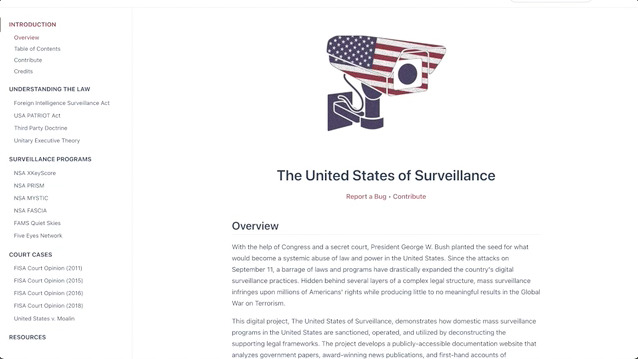The United States of Surveillance
Item
-
Title
-
The United States of Surveillance
-
Description
-
A digital demonstration presented at the DHSI 2021 – Online Edition Conference & Colloquium, June 7–14, 2021
-
Creator
-
Sebastian Rodriguez
-
Date
-
2021
-
Format
-
MOV, PDF
-
Rights Holder
-
Sebastian Rodriguez
-
Abstract
-
With the help of Congress and a secret court, President George W. Bush planted the seed for what would become a systemic abuse of law and power in the United States. Since the attacks on September 11, a barrage of laws and programs have drastically expanded the country's digital surveillance practices. Hidden behind several layers of a complex legal structure, mass surveillance infringes upon millions of Americans' rights while producing little to no meaningful results in the Global War on Terrorism.
This digital project, The United States of Surveillance, demonstrates how domestic mass surveillance programs in the United States are sanctioned, operated, and utilized by deconstructing the supporting legal frameworks. The project develops a publicly-accessible documentation website that analyzes government papers, award-winning news publications, and first-hand accounts of surveillance programs. By disentangling the juridical intricacies, the project aims to make surveillance laws, programs, and ramifications accessible and understandable to the general public. The project specifically explores how the Foreign Intelligence Surveillance Act, the PATRIOT Act, the third-party doctrine, and the unitary executive work together to legalize domestic mass surveillance. It provides a brief overview of the country's most notorious mass surveillance programs, including MYSTIC, ECHELON, and FASCIA. Finally, the project reveals how programs such as these continue to be perpetuated under a FISA court exemption to the Fourth Amendment's search protections, one that effectively granted the court power to change Constitutional law without public knowledge.
By translating complex legalese into understandable explanations, The United States of Surveillance not only reveals how the current surveillance state systematically threatens the rights of citizens but provides them with information that can be used to reassert their rights to privacy and consent, as well as resist further erosion of democratic governance.
-
Type
-
Digital Demonstration




